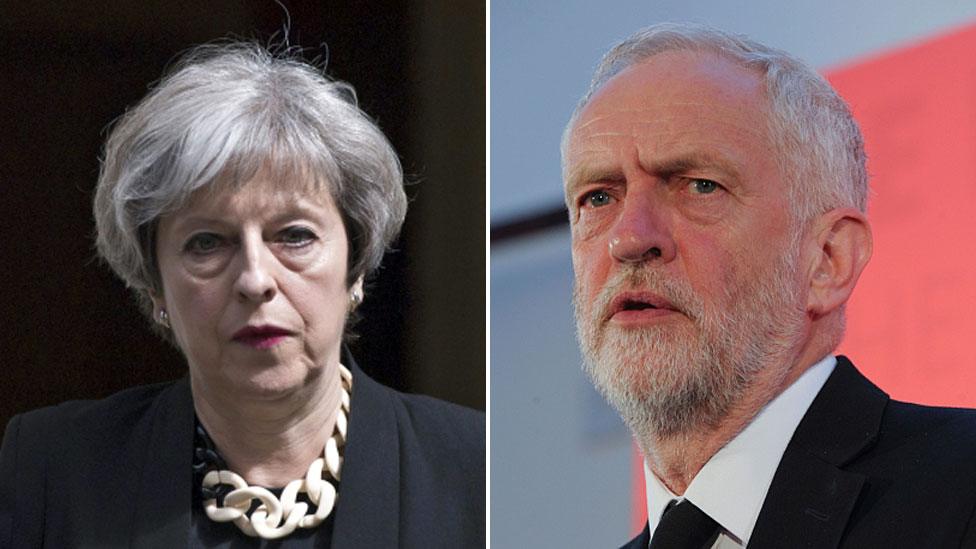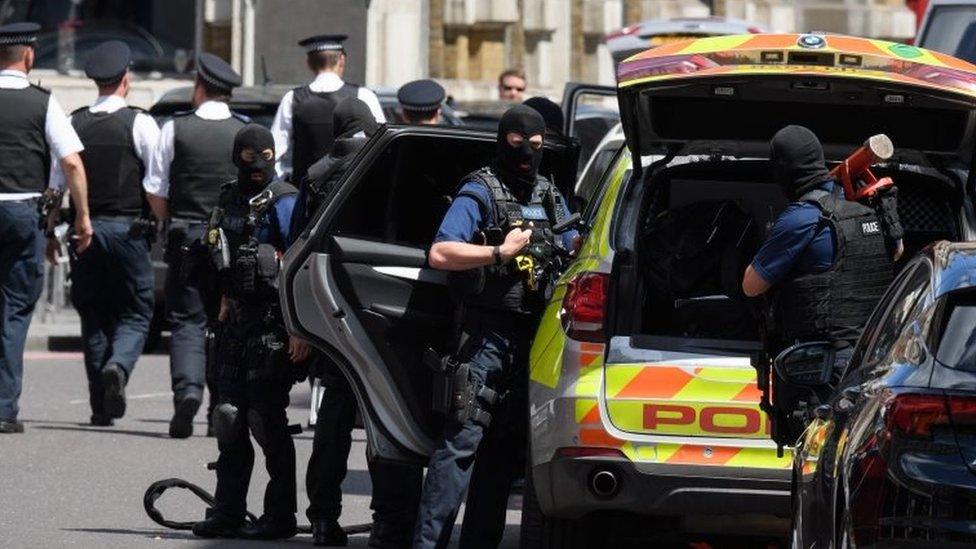Election 2017: Impact of London terror attack on campaign
- Published

For the second time in as many weeks, the prime minister had to respond to a terror attack that had killed innocent people, struck down while enjoying themselves.
But Theresa May's address this morning was without question a much higher voltage performance, with a bold claim, "enough is enough", and a closing promise to take on our "enemies".
It may not have been officially a campaigning speech, but it was intensely political.
Events of the past 24 hours have changed the backdrop of the closing stages of this election campaign, and will shape the tenor of the last few days, the statements by politicians, and the questions asked of them.
What did, however, Theresa May actually mean? Was her pointed speech any more than campaign rhetoric?
It is clear that prime minister wants to pursue new policies to address the terror threat if re-elected.
'Criminalising people'
The Tory manifesto had already promised to consider new criminal offences to address extremism, potentially increasing the length of prison sentences for lesser offences involved in spreading extremism rather than committing acts of terror themselves.
They also plan, if back in government, to set up a commission to counter extremism, to define and root it out. Theresa May compares the effort needed to combat its ideas to the fight over decades that made racism less and less and less acceptable.
It's also surely possible, if she wins a decent majority, that she might return to some of the ideas that she put forward as home secretary that never made it to the statute book.
In a similarly strongly worded speech back in 2015, she warned terrorists, "the game is up".

Policing and security are in the spotlight
As home secretary then she planned new more controversial powers, like banning orders, for groups who promote extremism, or closure orders, powers to shut down premises if they were used by extremists.
But those proposals were widely criticised, described as "criminalising people for thinking bad thoughts".
A Westminster committee found the government had "not been able to demonstrate a significant gap in the framework" of the law, that new laws were required to fill.
'Unprecedented scale'
Ministers struggled to agree a definition of extremism, delaying the bill again and again. Ultimately, and ironically given her speech today, the Counter Terrorism Bill was dropped because Theresa May called the election.
After these recent attacks however, it is clear in the mind of Number 10 that the circumstances have changed, and as the threat intensifies, so the government response must evolve.
The simple reason? The number of plots are multiplying, many more than when Theresa May first set out those plans.
A Whitehall source said we now face them on an "unprecedented scale".
Between the attack on Lee Rigby in 2013 and March 2017, Whitehall sources say 13 plots were foiled.
Between March 2017 and now, there have been three plots that have got through - in Westminster, Manchester and London Bridge, and a further five have been foiled. Thirteen plots over four years, followed by eight plots in 70 days.
Voters choose their political parties for all sorts of different reasons.
But as this strange election hurtles towards its close, the demand of who can keep the country safe is firmly on the table.
Police budgets
For Theresa May that doesn't just mean questions over how she would counter extremism if she stays in power.
But she faces criticism too over the Tories' record on squeezing money for the police.
Labour leader Jeremy Corbyn has repeated his promise to reverse the cuts and slammed the Tories tonight, warning the government could not "protect the public on the cheap".
He also tried to counter perceptions that he is soft on security, including his earlier stance on shoot to kill, which he questioned days after the Paris attack at the Bataclan.
He said, if he were prime minister he would take "whatever action is necessary and effective" to protect the public.
After a brief pause, the election campaign is well and truly back, even with a more subdued tone, and with security as its subject.
If re-elected, Theresa May could find a more willing Parliament to resuscitate her plans to tackle extremism.
But just as her victory is far from guaranteed, neither is a better reception for ideas that previously found too little support.